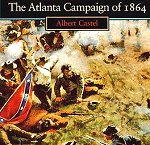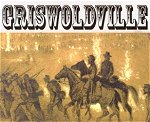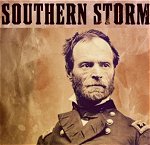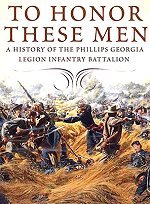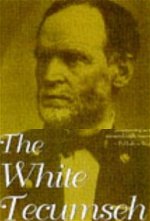| For the last ten years we have had numerous and serious causes of complaint against our non-slave-holding confederate States with reference to the subject of African slavery. They have endeavored to weaken our security, to disturb our domestic peace and tranquility, and persistently refused to comply with their express constitutional obligations to us in reference to that property, and by the use of their power in the Federal Government have striven to deprive us of an equal enjoyment of the common Territories of the Republic. This hostile policy of our confederates has been pursued with every circumstance of aggravation which could arouse the passions and excite the hatred of our people, and has placed the two sections of the Union for many years past in the condition of virtual civil war.
Our people, still attached to the Union from habit and national traditions, and averse to change, hoped that time, reason, and argument would bring, if not redress, at least exemption from further insults, injuries, and dangers. Recent events have fully dissipated all such hopes and demonstrated the necessity of separation. Our Northern confederates, after a full and calm hearing of all the facts, after a fair warning of our purpose not to submit to the rule of the authors of all these wrongs and injuries, have by a large majority committed the Government of the United States into their hands. The people of Georgia, after an equally full and fair and deliberate hearing of the case, have declared with equal firmness that they shall not rule over them. A brief history of the rise, progress, and policy of anti-slavery and the political organization into whose hands the administration of the Federal Government has been committed will fully justify the pronounced verdict of the people of Georgia.
The party of Lincoln, called the Republican party, under its present name and organization, is of recent origin. It is admitted to be an anti-slavery party. While it attracts to itself by its creed the scattered advocates of exploded political heresies, of condemned theories in political economy, the advocates of commercial restrictions, of protection, of special privileges, of waste and corruption in the administration of Government, anti-slavery is its mission and its purpose. By anti-slavery it is made a power in the state. The question of slavery was the great difficulty in the way of the formation of the Constitution. While the subordination and the political and social inequality of the African race was fully conceded by all, it was plainly apparent that slavery would soon disappear from what are now the non-slave-holding States of the original thirteen. The opposition to slavery was then, as now, general in those States and the Constitution was made with direct reference to that fact. But a distinct abolition party was not formed in the United States for more than half a century after the Government went into operation.
The main reason was that the North, even if united, could not control both branches of the Legislature during any portion of that time. Therefore such an organization must have resulted either in utter failure or in the total overthrow of the Government. The material prosperity of the North was greatly dependent on the Federal Government; that of the the South not at all. In the first years of the Republic the navigating, commercial, and manufacturing interests of the North began to seek profit and aggrandizement at the expense of the agricultural interests. Even the owners of fishing smacks sought and obtained bounties for pursuing their own business (which yet continue), and $500,000 is now paid them annually out of the Treasury. The navigating interests begged for protection against foreign shipbuilders and against competition in the coasting trade. Congress granted both requests, and by prohibitory acts gave an absolute monopoly of this business to each of their interests, which they enjoy without diminution to this day. Not content with these great and unjust advantages, they have sought to throw the legitimate burden of their business as much as possible upon the public; they have succeeded in throwing the cost of light-houses, buoys, and the maintenance of their seamen upon the Treasury, and the Government now pays above $2,000,000 annually for the support of these objects.
Theses interests, in connection with the commercial and manufacturing classes, have also succeeded, by means of subventions to mail steamers and the reduction in postage, in relieving their business from the payment of about $7,000,000 annually, throwing it upon the public Treasury under the name of postal deficiency. The manufacturing interests entered into the same struggle early, and has clamored steadily for Government bounties and special favors. This interest was confined mainly to the Eastern and Middle non-slave-holding States. Wielding these great States it held great power and influence, and its demands were in full proportion to its power. The manufacturers and miners wisely based their demands upon special facts and reasons rather than upon general principles, and thereby mollified much of the opposition of the opposing interest. They pleaded in their favor the infancy of their business in this country, the scarcity of labor and capital, the hostile legislation of other countries toward them, the great necessity of their fabrics in the time of war, and the necessity of high duties to pay the debt incurred in our war for independence. These reasons prevailed, and they received for many years enormous bounties by the general acquiescence of the whole country.
But when these reasons ceased they were no less clamorous for Government protection, but their clamors were less heeded-- the country had put the principle of protection upon trial and condemned it. After having enjoyed protection to the extent of from 15 to 200 per cent. upon their entire business for above thirty years, the act of 1846 was passed. It avoided sudden change, but the principle was settled, and free trade, low duties, and economy in public expenditures was the verdict of the American people. The South and the Northwestern States sustained this policy. There was but small hope of its reversal; upon the direct issue, none at all.
All these classes saw this and felt it and cast about for new allies. The anti-slavery sentiment of the North offered the best chance for success. An anti-slavery party must necessarily look to the North alone for support, but a united North was now strong enough to control the Government in all of its departments, and a sectional party was therefore determined upon. Time and issues upon slavery were necessary to its completion and final triumph. The feeling of anti-slavery, which it was well known was very general among the people of the North, had been long dormant or passive; it needed only a question to arouse it into aggressive activity. This question was before us. We had acquired a large territory by successful war with Mexico; Congress had to govern it; how, in relation to slavery, was the question then demanding solution. This state of facts gave form and shape to the anti-slavery sentiment throughout the North and the conflict began. Northern anti-slavery men of all parties asserted the right to exclude slavery from the territory by Congressional legislation and demanded the prompt and efficient exercise of this power to that end. This insulting and unconstitutional demand was met with great moderation and firmness by the South. We had shed our blood and paid our money for its acquisition; we demanded a division of it on the line of the Missouri restriction or an equal participation in the whole of it. These propositions were refused, the agitation became general, and the public danger was great. The case of the South was impregnable. The price of the acquisition was the blood and treasure of both sections-- of all, and, therefore, it belonged to all upon the principles of equity and justice.
The Constitution delegated no power to Congress to excluded either party from its free enjoyment; therefore our right was good under the Constitution. Our rights were further fortified by the practice of the Government from the beginning. Slavery was forbidden in the country northwest of the Ohio River by what is called the ordinance of 1787. That ordinance was adopted under the old confederation and by the assent of Virginia, who owned and ceded the country, and therefore this case must stand on its own special circumstances. The Government of the United States claimed territory by virtue of the treaty of 1783 with Great Britain, acquired territory by cession from Georgia and North Carolina, by treaty from France, and by treaty from Spain. These acquisitions largely exceeded the original limits of the Republic. In all of these acquisitions the policy of the Government was uniform. It opened them to the settlement of all the citizens of all the States of the Union. They emigrated thither with their property of every kind (including slaves). All were equally protected by public authority in their persons and property until the inhabitants became sufficiently numerous and otherwise capable of bearing the burdens and performing the duties of self-government, when they were admitted into the Union upon equal terms with the other States, with whatever republican constitution they might adopt for themselves.
Under this equally just and beneficent policy law and order, stability and progress, peace and prosperity marked every step of the progress of these new communities until they entered as great and prosperous commonwealths into the sisterhood of American States. In 1820 the North endeavored to overturn this wise and successful policy and demanded that the State of Missouri should not be admitted into the Union unless she first prohibited slavery within her limits by her constitution. After a bitter and protracted struggle the North was defeated in her special object, but her policy and position led to the adoption of a section in the law for the admission of Missouri, prohibiting slavery in all that portion of the territory acquired from France lying North of 36 [degrees] 30 [minutes] north latitude and outside of Missouri. The venerable Madison at the time of its adoption declared it unconstitutional. Mr. Jefferson condemned the restriction and foresaw its consequences and predicted that it would result in the dissolution of the Union. His prediction is now history. The North demanded the application of the principle of prohibition of slavery to all of the territory acquired from Mexico and all other parts of the public domain then and in all future time. It was the announcement of her purpose to appropriate to herself all the public domain then owned and thereafter to be acquired by the United States. The claim itself was less arrogant and insulting than the reason with which she supported it. That reason was her fixed purpose to limit, restrain, and finally abolish slavery in the States where it exists. The South with great unanimity declared her purpose to resist the principle of prohibition to the last extremity. This particular question, in connection with a series of questions affecting the same subject, was finally disposed of by the defeat of prohibitory legislation.
The Presidential election of 1852 resulted in the total overthrow of the advocates of restriction and their party friends. Immediately after this result the anti-slavery portion of the defeated party resolved to unite all the elements in the North opposed to slavery an to stake their future political fortunes upon their hostility to slavery everywhere. This is the party two whom the people of the North have committed the Government. They raised their standard in 1856 and were barely defeated. They entered the Presidential contest again in 1860 and succeeded.
The prohibition of slavery in the Territories, hostility to it everywhere, the equality of the black and white races, disregard of all constitutional guarantees in its favor, were boldly proclaimed by its leaders and applauded by its followers.
With these principles on their banners and these utterances on their lips the majority of the people of the North demand that we shall receive them as our rulers.
The prohibition of slavery in the Territories is the cardinal principle of this organization.
For forty years this question has been considered and debated in the halls of Congress, before the people, by the press, and before the tribunals of justice. The majority of the people of the North in 1860 decided it in their own favor. We refuse to submit to that judgment, and in vindication of our refusal we offer the Constitution of our country and point to the total absence of any express power to exclude us. We offer the practice of our Government for the first thirty years of its existence in complete refutation of the position that any such power is either necessary or proper to the execution of any other power in relation to the Territories. We offer the judgment of a large minority of the people of the North, amounting to more than one-third, who united with the unanimous voice of the South against this usurpation; and, finally, we offer the judgment of the Supreme Court of the United States, the highest judicial tribunal of our country, in our favor. This evidence ought to be conclusive that we have never surrendered this right. The conduct of our adversaries admonishes us that if we had surrendered it, it is time to resume it.
The faithless conduct of our adversaries is not confined to such acts as might aggrandize themselves or their section of the Union. They are content if they can only injure us. The Constitution declares that persons charged with crimes in one State and fleeing to another shall be delivered up on the demand of the executive authority of the State from which they may flee, to be tried in the jurisdiction where the crime was committed. It would appear difficult to employ language freer from ambiguity, yet for above twenty years the non-slave-holding States generally have wholly refused to deliver up to us persons charged with crimes affecting slave property. Our confederates, with punic faith, shield and give sanctuary to all criminals who seek to deprive us of this property or who use it to destroy us. This clause of the Constitution has no other sanction than their good faith; that is withheld from us; we are remediless in the Union; out of it we are remitted to the laws of nations.
A similar provision of the Constitution requires them to surrender fugitives from labor. This provision and the one last referred to were our main inducements for confederating with the Northern States. Without them it is historically true that we would have rejected the Constitution. In the fourth year of the Republic Congress passed a law to give full vigor and efficiency to this important provision. This act depended to a considerable degree upon the local magistrates in the several States for its efficiency. The non-slave-holding States generally repealed all laws intended to aid the execution of that act, and imposed penalties upon those citizens whose loyalty to the Constitution and their oaths might induce them to discharge their duty. Congress then passed the act of 1850, providing for the complete execution of this duty by Federal officers. This law, which their own bad faith rendered absolutely indispensible for the protection of constitutional rights, was instantly met with ferocious revilings and all conceivable modes of hostility. The Supreme Court unanimously, and their own local courts with equal unanimity (with the single and temporary exception of the supreme court of Wisconsin), sustained its constitutionality in all of its provisions. Yet it stands to-day a dead letter for all practicable purposes in every non-slave-holding State in the Union. We have their convenants, we have their oaths to keep and observe it, but the unfortunate claimant, even accompanied by a Federal officer with the mandate of the highest judicial authority in his hands, is everywhere met with fraud, with force, and with legislative enactments to elude, to resist, and defeat him. Claimants are murdered with impunity; officers of the law are beaten by frantic mobs instigated by inflammatory appeals from persons holding the highest public employment in these States, and supported by legislation in conflict with the clearest provisions of the Constitution, and even the ordinary principles of humanity. In several of our confederate States a citizen cannot travel the highway with his servant who may voluntarily accompany him, without being declared by law a felon and being subjected to infamous punishments. It is difficult to perceive how we could suffer more by the hostility than by the fraternity of such brethren.
The public law of civilized nations requires every State to restrain its citizens or subjects from committing acts injurious to the peace and security of any other State and from attempting to excite insurrection, or to lessen the security, or to disturb the tranquillity of their neighbors, and our Constitution wisely gives Congress the power to punish all offenses against the laws of nations.
These are sound and just principles which have received the approbation of just men in all countries and all centuries; but they are wholly disregarded by the people of the Northern States, and the Federal Government is impotent to maintain them. For twenty years past the abolitionists and their allies in the Northern States have been engaged in constant efforts to subvert our institutions and to excite insurrection and servile war among us. They have sent emissaries among us for the accomplishment of these purposes. Some of these efforts have received the public sanction of a majority of the leading men of the Republican party in the national councils, the same men who are now proposed as our rulers. These efforts have in one instance led to the actual invasion of one of the slave-holding States, and those of the murderers and incendiaries who escaped public justice by flight have found fraternal protection among our Northern confederates.
These are the same men who say the Union shall be preserved.
Such are the opinions and such are the practices of the Republican party, who have been called by their own votes to administer the Federal Government under the Constitution of the United States. We know their treachery; we know the shallow pretenses under which they daily disregard its plainest obligations. If we submit to them it will be our fault and not theirs. The people of Georgia have ever been willing to stand by this bargain, this contract; they have never sought to evade any of its obligations; they have never hitherto sought to establish any new government; they have struggled to maintain the ancient right of themselves and the human race through and by that Constitution. But they know the value of parchment rights in treacherous hands, and therefore they refuse to commit their own to the rulers whom the North offers us. Why? Because by their declared principles and policy they have outlawed $3,000,000,000 of our property in the common territories of the Union; put it under the ban of the Republic in the States where it exists and out of the protection of Federal law everywhere; because they give sanctuary to thieves and incendiaries who assail it to the whole extent of their power, in spite of their most solemn obligations and covenants; because their avowed purpose is to subvert our society and subject us not only to the loss of our property but the destruction of ourselves, our wives, and our children, and the desolation of our homes, our altars, and our firesides. To avoid these evils we resume the powers which our fathers delegated to the Government of the United States, and henceforth will seek new safeguards for our liberty, equality, security, and tranquillity.
[Approved, Tuesday, January 29, 1861]
|
